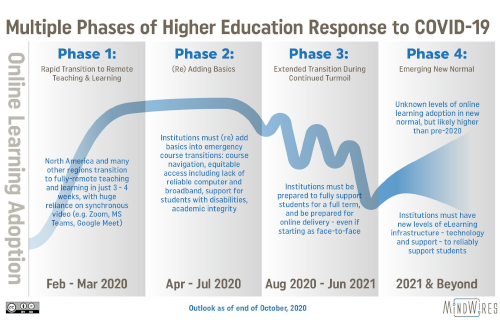Topics【Trends】Current Trends in Education Utilizing ICT

Outlook for Spring 2021 in Higher Education Institutions in the United States
【Trends】No.17 Published on December 4, 2020.
In "Trends," we will present various topics related to the current form of education that uses Information and Communication Technology (ICT).
In December, the second semester 2020 has arrived at an important moment. The higher education institutions are working hard at implementing urgent measures because of the resurgence in the transmission of novel coronavirus disease (COVID-19) in every part of the world. At the same time, higher education institutions are preparing for the next semester and the next academic year. Kevin Kelly, a higher education consultant and a lecturer at San Francisco State University, discusses on the educational technology blog named PhilOnEdTech course delivery formats for the spring 2021 semester in U.S. higher education, based on announcements and website articles from more than 30 colleges across the United States.
According to Mr. Kelly, U.S. higher education's course delivery formats for the spring 2021 term are expected to show no major changes. Rather, they will be almost the same as the fall 2020 formats: colleges that introduced online classes in the fall will remain online and those that (more or less) introduced in-person classes will continue to the format.

PhilOnEdTech "Multiple Phases of Higher Education Response to COVID-19: Outlook as of end of October 2020"
*Click the image to view the original article.
He also mentions that colleges that allowed students to return to campus for delivering classes in-person or in a hybrid format have streamlined their academic calendars to control the spread of the virus. For example, some of them plan to delay the start of the fall semester or cancel spring break in lieu of inserting weekday holidays.
Mr. Kelly expresses his view that the transition to a new normal will take some time, writing that COVID turmoil is still continuing at universities and that U.S. higher education is in the middle of its transition to the new normal (see the figure on the left). It seems that as of the end of October 2020, when this article was posted, higher educational institutions in the United States were having difficulties in announcing their new post-COVID educational policy.
For details, please refer to the original article ("Phase 3 of Higher Ed's Response to COVID Will Extend the Turmoil Through Spring 2021", October 27, 2020).
Published online: December 4, 2020 (Original article)
June 6, 2021 (English article)
Previous "Trends" articles are available from the following links.
No.16: "Preparation for Hybrid Instruction in Overseas Countries" (Published on October 27, 2020)
No.15: "Media-Facilitated Classroom" (Published on March 9, 2020)
No.12: "MOOC-Based Study Abroad Program "Virtual Exchange Program" (Published on July 9, 2019)
No.8-10: "Series: MicroMasters" (Published on June 11, 2018; June 25, 2018; July 12, 2018)
No.7: "Active Learning Space as the Top Ranked Item" (Published on Februrary 20, 2018)
No.5: "Rice University's Project on Open-Source Textbooks: OpenStax" (Published on October 4, 2017)
No.4: "MIT Teaching with Digital Technology Awards" (Published on September 20, 2017)
No.3: "Future of Higher Education with AI?" (Published on July 21, 2017)
No.2: "VR and AR Technologies in Higher Education" (Published on July 11, 2017)

